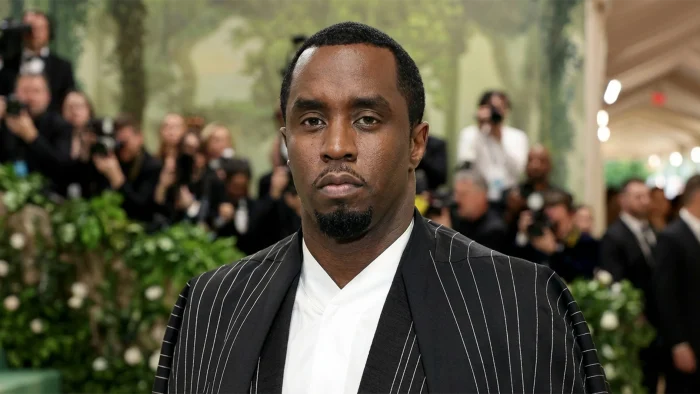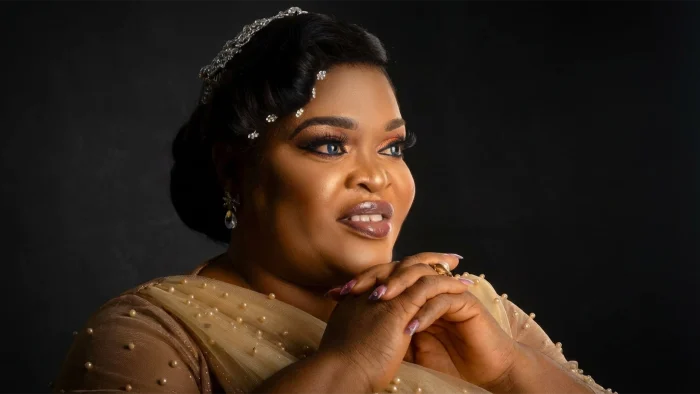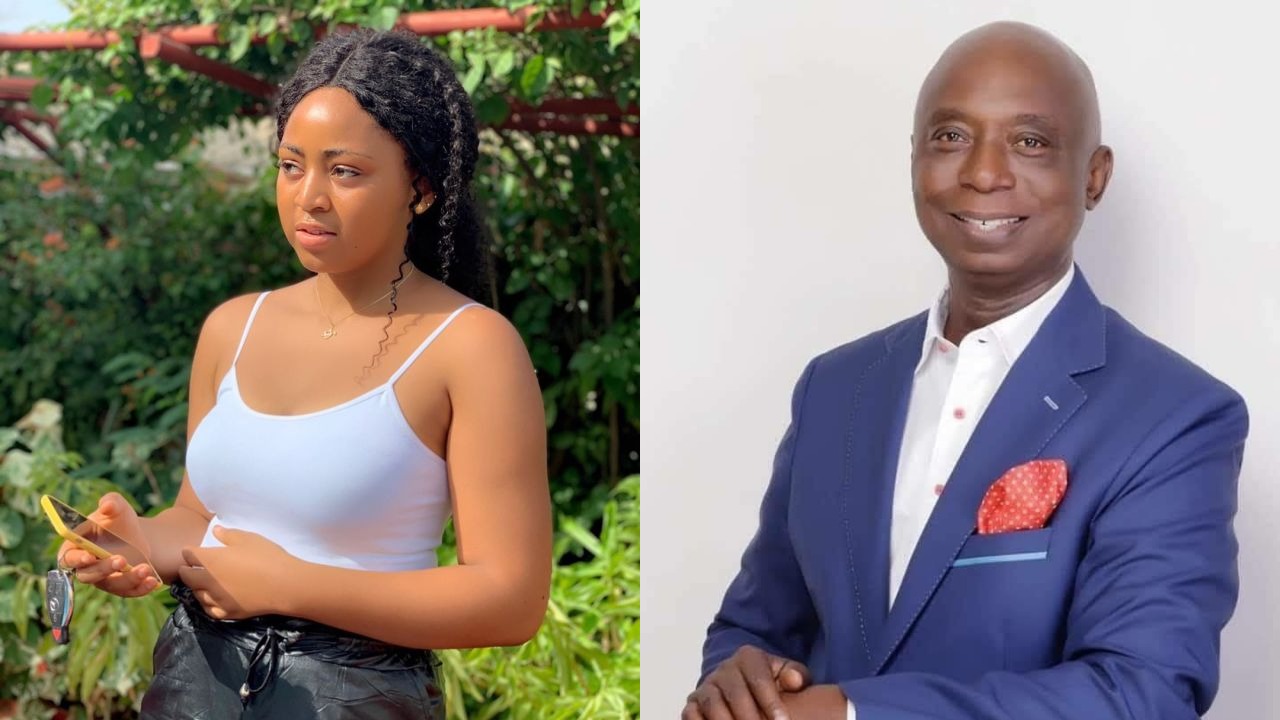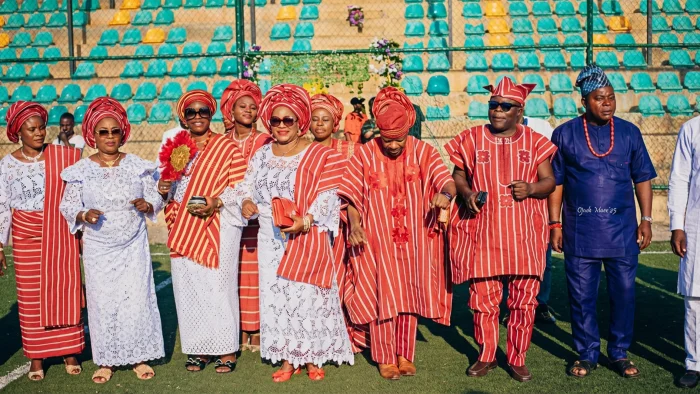One interesting thing about Praise Onyeagwalam is that she is always on the move.
“Forgive me for the inconvenience; I am currently driving,” she apologises, as the virtual conversation began. In fact, one could hear her find a comfortable spot to settle in for the chat.
[ad]
For most music video directors like Onyeagwalam, professionally known as Director Pink, one must always be on the go. Yet, it is this very same relentlessness that has bootstrapped Director Pink’s recent rise as one of the youngest and existing female music video directors in Nigeria.
Unlike other facets of the Nigerian music industry, such as singing, songwriting or sound engineering, among others, music video directing is still a male dominated scene. Apart from the Kemi Adetibas or the Kiki Melissas in the game, there are virtually only a handful of music video directors that have broken into the mainstream.
It is so low that you can barely count up to five who have directed a music video to any song on the Top 100 chart in Nigeria. Despite the clamour for inclusivity, the reality continues to haunt everyone in the industry.
Nonetheless, hope continues to offer its comfort in the artistry of people like Director Pink, who has also been nominated among other prolific directors in the forthcoming 2022 Headies awards. Her stellar work with superstar musicians such as the video for the Chike featuring Mayorkun bop, If You No Love, as well as the visuals for the Chike featuring Simi record, Running, and other more recent videos like the one for Killertunes’ smash hit, WYD, have spotlighted her as an exceptional storyteller. The 22-year-old continues to colour the industry with her enigmatic artistry, breaking the monopoly that leaves her work as restricted to ‘a man’s world.’
[ad]
For this week’s Guardian Music Special, she chats about her journey so far within the music scene, reminiscing on her earlier struggles to break into the mainstream, as well as rebel against stereotypes that attempt to clog her progress, and what that has changed for her so far, and so many more.
You are among the very few female directors in the industry and you’ve already been nominated for your first Headies. How do you feel about that?
I FEEL great; I don’t really know how to feel. I feel like… I mean, I feel it’s so fast. I don’t know, but yeah, we thank God.
Why is it a surprise to you that it’s happening now?
Maybe because I underestimated myself; I guess so.
Why did you underestimate yourself?
I think it’s probably like a childhood thing; I just did not really expect it, I mean. I don’t know if you understand. You will just have like… I don’t know. You know when you are just like ‘Omo!’ So, like it just came all of a sudden.
How long have you been shooting?
So, I have been properly directing since the beginning of 2020, Properly.
[ad]
What drove you to filmmaking?
Basically, I think everyone would say, ‘oh, the love for it.’ I think it was just by chance, to be honest. I started it in church, so that was like a few years back when I started shooting church programmes, church services. So, it was just by chance; I just do it.
In church, they just wanted me to join like something; it’s either you are in the choir or usher and I felt like it was too normal. Maybe I didn’t want to be standing up too much like it was just a whole lot. So, I decided to just go to the whole video team, but then it looks like it’s very challenging, but I think I liked it, because I was the only lady. So, it was really good. That was how I think I kind of had that love. I was like, you know what, I think I want to go for this.
So, how did you develop your skills?
I didn’t go to any special film school; I probably always wanted to, you know, create. When you feel like, ‘I think I like my ideas being implemented.’ It feels like a feeling to watch your ideas and your ideas are actually connecting well.
So, I didn’t go to any special film school; I was just learning from online courses, videos. I mean, it was a whole lot, but then I was just always willing to just get one or two; do new things every single day.
So, while at it, were you making any money from it?
Not really. When I was starting, I was making a lot of money, because I wasn’t even just like a videographer; I was a graphic designer. I was doing animation, I was doing like a whole lot; I was really painting. So, that was when the actual little bits of money were coming. I’ve literally been a hustler.
[ad]
So, how did you fund your hustle?
It was bit by bit. I mean, it started from N2k for every logo or N1500, all those things. Bit by bit, I was able to get things like my laptop, things like that. So, that was just how it grew to be honest. So, every little kobo counts. It wasn’t even just about the money, because the money was literally just going into print out I wanted to use to boost up what I was doing. So, it wasn’t just the money.
How did your family and friends react to you delving into a male-dominated industry?
Well, I think maybe it’s because of where I started from; I started from the church, so it kind of blended well. You know your parents and church… there’s this mix. So, I think that was because I started from the church. It didn’t look like anything of a big deal. To be honest, your parents will wholly accept what you do, if they see that, ‘okay, the thing is actually bringing in money for you.’
To be honest, most of the time, that’s why if you notice, when they try to dictate for you, it’s not like they want something bad for you, they just want you to get the sure banker; the surest job, the surest occupation that you know is okay. Worst comes to worst, you will probably get something doing. But then, they kind of forget that technology is on the rise. There are so many things that we were not doing then that we are doing now.
I think everybody is getting wiser by the day, even though there are still some people who are still into that traditional form of you trying to dictate whatever for their kids and all that. But for me, everybody took it well and at least, I was making little money.
So you also studied at the University of Lagos; what did you study?
Economics.
So, were you also at some point contemplating having a white-collar job?
Omo, this is not for me at all. It’s funny how what we do right now is much more stressful than a white-collar job. I mean, most white-collar jobs, you are probably in one position all through and you are trying to do something; I don’t know if you get me. But I would rather prefer jumping up and down.
[ad]
Jumping up and down feels less stressful for me than sitting in one place; I don’t know if you understand me. So, I never actually really saw myself in a white-collar job. I worked somewhere as a video editor, but the fact that I had to go to the office almost every day… I was not going to the office every day, no. I was going to the office every day at some point, but it was so mentally draining; I was tired.
I think maybe it was because I was trying to blend in with my directing, so there was like a clash. But then, it was so tiring. The fact that I will go to the office, I’m seeing people, people are talking about marketing analysis… I didn’t just like it.
Could you recall the first major video shoot you did?
That should be If You Know Love, I think that should be it. That should definitely be it, because I had to do that under Clarence and it just really put me out there. So, that should be If You Know Love, because that was with Chike and Mayorkun.
Interestingly, you’ve worked with Chike multiple times now. Was that because he was one of the people that took that chance on you?
Well, he did, but most importantly, it was his manager that literally believed in me. I know that Chike was still contemplating it, even though he didn’t have an issue with me, but he was really contemplating whether I could handle the work. Even when we wanted to shoot for Roju, Chike will call me at 3am in the morning and tell me honestly that Roju is a song after his heart and I needed to do this and that. It was so funny. However, his manager, Ogaga, just believed that I could actually do it.
[ad]
So, how did you think you were able to convince Ogaga?
I destroyed his phone with calls, because he told me to do a treatment and at the end said he just wanted to run away. I destroyed him with calls. Then, I think later on, he spoke to Clarence and I don’t know what Clarence told them till now, but ever since then, we’ve just had that good relationship.
You’ve been nominated for your first award at the Headies. Things are changing, but do you still feel like there is this some sort of bias towards you as a female music director?
Yeah, there used to be, but I think of probably breaking the bias little by little. Well, there is still though. But then, I think I’ve tried my best to just block my eyes off all that. By the time you see my job, you definitely would want to come to me. So, I always just try to just make sure that everything I put out there is very solid, to be honest.
What’s your creative style?
So, number one, I don’t kill myself. When I say I don’t kill myself, I mean I, let’s say for example an artist sends me a song. Obviously, I can’t expect myself to understand the concept of the song at that particular time. Sometimes, it happens; I will just get the idea at once and we move. Sometimes, it takes a little bit or a while for me to calm down and digest the concept. Sometimes, if I am not getting a concept well, if I am having a creative block, I just stay away from work for a while and come back to it maybe like in the day or something.
Then, things must keep popping up and it could even be something I just probably saw on the road and I’m just like, ‘okay, this works; let’s move.’ So, I always connect all my dots together. When I do my treatment, over to shoot, I always have like my short list. I always make sure that I follow every single thing and you know try to make like my team. You know, always try to build that good relationship with my team. Once your team is gone, to be honest, you as well you are also gone. So, everybody has to be happy for you to create something that will make your client happy.
[ad]
As a woman, do you feel any sort of pressure right now when you are competing in the industry?
I think right now, the pressure is like so much more, as much as I try to prove myself while I was coming out. Right now, I try to prove myself times ten; I need to stay at this particular point. I said that there is much more pressure than before, because the pressure you face while trying to come up, is going to be times two, because you are trying to maintain your standards; it literally tends to. So, you just have to keep proving to people that, ‘Yo, I deserve to be part of this.’
Do you think female musicians are very supportive of female video directors?
Most of them are actually very supportive to be honest. They actually feel calm; they feel safer with you. They feel like they can relate like other things to you than most guys. Sometimes, most guys don’t really care, like ‘abeg abeg abeg, I don’t care about her hair.’ Even me, I’m like, ‘okay, your lashes…’ I understand the tiny, tiny bits that some men might not understand. They just feel calmer with me. I’ve not really had any lady feel like, ‘no, I don’t want to work with her, because she is a lady.’ I think we are always so supportive.
Who are the three artistes you would love to work with?
That’s Davido, Wizkid and Burna boy.
Among all your videos, the big gigs, what’s like that one video that really challenged you so much?
That will be Nwoke Oma. They had like CGI in it and it was something I could really relate to. So, as much as I felt so emotional while shooting it, it was really challenging, because I wanted it to look really good. And I’m glad it came out well.
[ad]
So, why do you use the moniker Director Pink?
Nothing serious; I feel the color is significant to ladies. It doesn’t mean it is my best colour.
As Director Pink, what is next for you?
I just want to keep creating and I just pray I don’t stop creating. So, that’s the vision, to just keep creating and to just inspire. Create and inspire. I’m sure that we have women in other aspects of films, because it’s not just about directing. We still need female graphers, there’s a whole lot that we actually need ladies in. Not things like you know directing or others, because I would love to see a full-blown production with just women and
I want to say, ‘Oh my God, this is amazing.’
Finally, if you were to assess the industry, how would you rate it?
It’s getting better by the day. And I think it gets better as much as technology gets better. Sometimes, it’s an issue with the stories, but I don’t want to shade anything or anyone.
There are times that you will feel like it’s a very good story, but cinematography is like zero and the story telling too is zero. So, it works both ways.
[ad]








